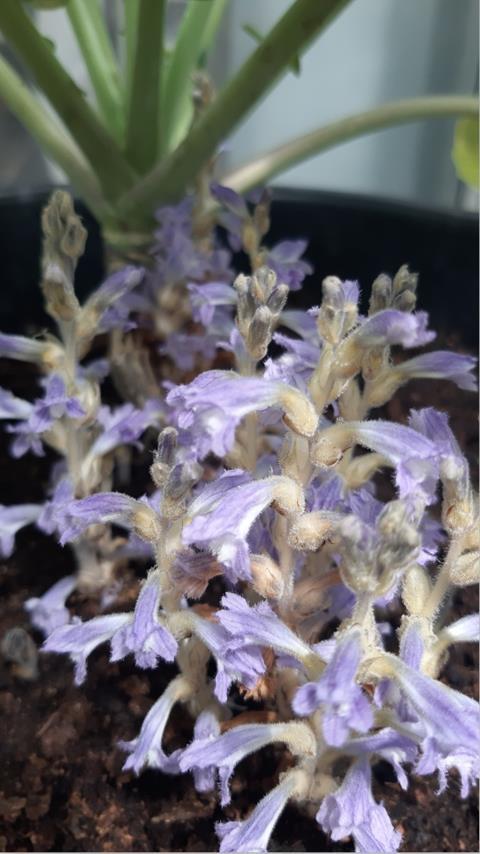Scientists have discovered that a phloroglucinol-producing Pseudomonas strain shows promise as a biocontrol agent against parasitic plants such as broomrapes that result in major losses in crops.
The Rhizosphere team of the Microbial Ecology lab at University Claude Bernard Lyon published their findings in ‘Inhibition of broomrape germination by 2,4-diacetylphloroglucinol produced by environmental Pseudomonas’, which has been accepted by Microbial Biotechnology, an Applied Microbiology International publication.
Impossible broomrape
Until now, no strategy has been particularly effective against broomrapes. Different agricultural strategies have attempted to regulate broomrape populations in agroecosystems, such as crop rotation, the use of host plant varieties less sensitive to the parasite or of chemical herbicides.
However, the use of chemical herbicides is controversial in an ecological context as they are toxic to the environment, to the health of farmers and to agro-systems.

“So, we proposed to search for biological control solutions to limit broomrape infestation, including the use of microorganisms that are friendlier for the environment,” explained corresponding author Dr. Claire Prigent-Combaret.
Biocontrol agent
“We discovered a new role for phloroglucinol-producing Pseudomonas as a biocontrol agent against parasitic plants like broomrapes which cause important losses in crops. This work was performed during the course of a project called ‘WeedsBiocontrol’ which I coordinated. The research was performed by Tristan Lurthy, post-doc on this project,” she said.
“Given that phloroglucinol compounds (PGCs) produced by environmental Pseudomonas could be toxic towards certain plants, we assessed whether the bacterial model strain Pseudomonas ogarae F113, a PGCs-producing bacterium, could have a potential herbicidal effect on parasitic weeds of the Orobanchaceae family.
“By combining the use of a mutagenesis approach and of pure PGCs, we evaluated the in vitro inhibiting effect of PGCs produced by P. ogarae F113 on broomrape germination, and we assessed the protective activity of a PGC-producing bacterium on oilseed rape (Brassica napus) against Phelipanche ramosa (a broomrape affecting oilseed rape) in non-sterile soils.
Irreversible inhibition
“We showed that the inhibition of the germination depends on the PGCs molecular structure and their concentrations as well as the broomrape species and pathovars. This inhibition caused by the PGCs is irreversible, causing a brown coloration of the broomrape seeds.
“The inoculation of PGCs-producing bacteria limited the broomrape infection of B. napus, without affecting the growth of the host. Moreover, elemental profiling analysis of oilseed rape revealed that neither F113 nor applied PGCs affect the nutrition of the oilseed rape host.”
The team were surprised at the capacity for Pseudomonas strains producing PGC to be used as biocontrol agent in a new domain, bioherbicide against parasitic plant, with no negative effect on the host plant.
Eco-friendly approach
“This provides a new alternative direction for the development of natural bioherbicides, environmentally friendly, to ward off parasitic plant infections. This research could lead to decreasing the yield losses caused by broomrapes, increasing food quantity for an increasing world population,” Dr Prigent-Combaret said.
“The use of PGCs-producing Pseudomonas as bioherbicide against broomrapes should be tested in the field, on different crops, to evaluate their potential as biocontrol agents. Formulation should also be developed to maximise their establishment in soils during crop growth.”
The study was supported by ANR EcophytoMaturation 2019-2023 (Project-ANR-19-ECOM-0002) and ANR France Relance and by industrial partners, especially Greencell (Clermont-Ferrand head by J-Y Berthon; https://www.greencell.tech/).
‘Inhibition of broomrape germination by 2,4-diacetylphloroglucinol produced by environmental Pseudomonas’ appears in Microbial Biotechnology, an Applied Microbiology International publication.
Topics
- Agriculture
- ANR EcophytoMaturation
- ANR France Relance
- Applied Microbiology International
- biocontrol
- bioherbicide
- Brassica napus
- broomrape
- Claire Prigent-Combaret
- Greencell
- Healthy Land
- New nitrogen-fixing bacteria for sustainable agriculture
- parasitic plant
- Phelipanche ramosa
- phloroglucinol
- Pseudomonas
- Pseudomonas ogarae
- Research News
- Soil & Plant Science
- Tristan Lurthy
- UK & Rest of Europe
- University Claude Bernard Lyon







No comments yet